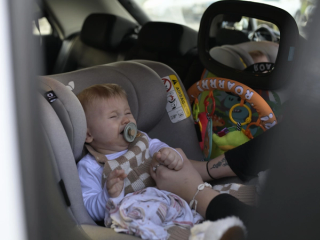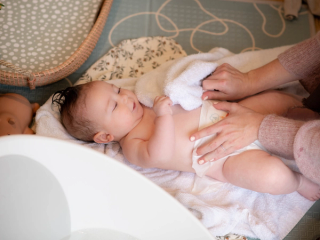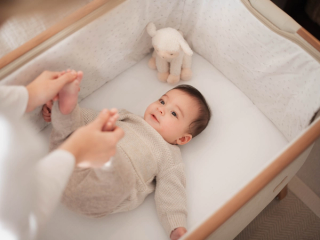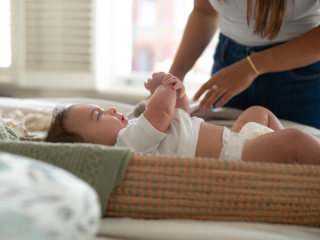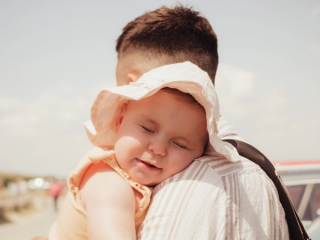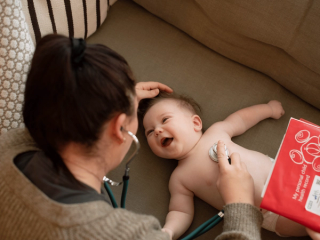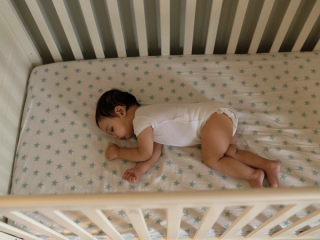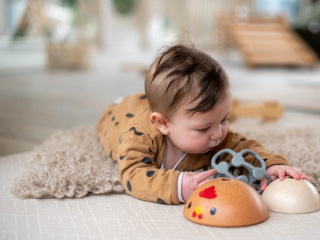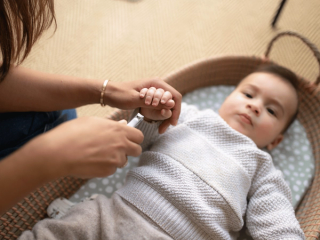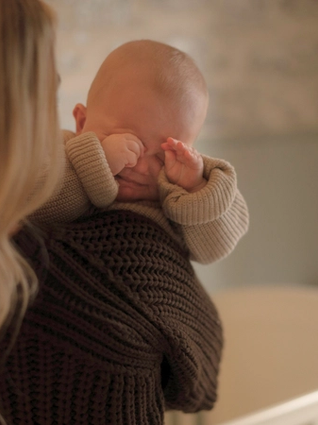
- Home
- Advice And Support
- Newborn
- Essential Newborn Care
- Baby Sleep Regression
Baby sleep regression
We have asked our sleep expert, Laura, to give you the full rundown on all things to do with your little one's sleep regression.
Just when you think you’re into a good routine with your baby’s sleep, and you may actually have this sleep thing sorted – out of nowhere, it all falls apart again!
If this is happening to you, it may be sleep regression. Don’t panic; this is totally normal, and not a sign that you’ve ‘broken’ your baby! Best of all, like all phases your child will go through, it won’t last forever.
But what is it, and when is it most likely to happen? Let’s explore.
What is a sleep regression?
A sleep regression is a period of time when a baby who has previously been sleeping well suddenly has trouble sleeping, or starts waking up more frequently during the night. Whilst sleep regressions are a normal part of your child’s development, they can be frustrating and exhausting for parents.
There are several common sleep regressions that can occur as your child grows - although people will have you believe there are many, many more! Not all babies will be affected by all or any of these regressions. I have outlined what is happening at each stage and how you can support your baby through the regression.
4-month sleep regression
The 4-month sleep regression is one of the most well-known and talked about sleep regressions. It really is talked about A LOT and you could be forgiven for thinking this is all just a myth! However, there are real biological changes happening for your baby’s sleep patterns. At around 3 – 6 months old, babies start to develop more adult-like sleep patterns. Before this time your baby goes through just two sleep cycles, REM and Non REM, essentially deep and not deep sleep!
From around 4 months they mature and cycle down through all the various stages of sleep and then back up through the various stages. They are therefore experiencing brand new stages of sleep and during these new, lighter stages they can be easily woken. So, a baby who was managing 4-6 hour stretches of sleep may now be waking every 2 hours because they don’t quite know how to knit their sleep cycles together yet in order to stay asleep!
This huge development is actually great news because it means your baby is ready to start taking more of a lead in how they fall asleep and you can consider a sleep training approach that aligns with your parenting philosophies.
You can help your baby get through the 4-month sleep regression by sticking to a consistent sleep routine and making sure your baby is well-rested during the day. Remember your baby will also need a sleep environment optimal for sleep. Keeping the room dark and calm and using white noise can be helpful. This is also an ideal time to start giving your baby the opportunity to practice settling themselves to sleep.
8-month sleep regression
Your baby is growing and developing their own unique personality. They are learning new skills every day and have started weaning. The 8-month sleep regression is another common regression that parents may experience.
At around 8-10 months there are a couple of things happening for your baby that can affect their sleep, although won’t always! The first thing to consider is that your baby’s sleep needs may be changing. It is common at this age for babies to begin dropping their late afternoon nap, and they may also be starting to manage to stay awake for slightly longer stretches throughout the day.
The next thing to remember is that your baby is becoming much more aware, and now is the time that habits will begin to be cemented. That means now is the perfect time to ensure you have plenty of helpful sleep associations in place for your baby. Things like your bedtime routine and goodnight ritual before you put your baby into their cot will set them up to be able to start sleeping through the night. It is also a good time to consider a plan for moving away from any sleep habits that are not serving your family and may be becoming unsustainable.
This regression is often caused by separation anxiety, as babies start to become more aware of their surroundings and may become anxious when separated from their primary caregiver. Your baby has been learning the concept of object permanence, the idea that just because they cannot see something it doesn’t mean it’s not there. They are also more able to distinguish between different people and have likely formed a strong bond with their caregivers. To help with this, try playing games to help your baby understand that when you ‘go away’, you will still come back! Peekaboo and lift the flap books are ideal for this.
12-month sleep regression
Your baby is a whole year old. Surely sleep should be on track by now and they should be sleeping through the night … right!? Actually, there is so much going on at 12 -months that sleep regression it is quite common. This regression is often caused by the development of new skills, such as walking, crawling, or talking. Babies may become more excited or stimulated by these new skills, which can make it harder for them to settle down and fall asleep. You may experience nap refusal or shorter naps, bedtime battles, new night waking or early rising as your baby processes all their new learning.
At one year your baby may well be walking or be trying really hard to start walking, pulling up and cruising. Babies will also be practicing lots of fine motor skills at this age – lining up objects, posting, stacking, filling and emptying containers. You may also have noticed that they are copying all you do, imitating sounds and words and trying to help you around the house - never again will they be so helpful with the cleaning! They are processing so much new information it is no wonder that sleep can become tricky. It’s a little bit like when we start a new job and have to go through all the training; our minds spin when our heads hit the pillow, too! To help with all of this try to ensure plenty of opportunity for your baby to explore and practice new skills during wake times by creating a baby- safe space for them to play freely. I also highly recommend incorporating plenty of time outdoors into your child’s day to offer new visual stimulation and opportunity to be active.
At 12 months you may find your baby suddenly starts to display signs of separation anxiety again and as they become more aware of themselves and their surroundings they may suddenly find the transition to sleep more challenging. Incorporating set 1:1 time into your day with no outside distractions will support your baby with this, particularly focusing on this before sleep times and after periods of separation such as nursery or childcare. From 12 months you are also able to introduce a small comfort item for your child to sleep with.
Just a (frustrating) phase
In conclusion, experiencing a sleep regression with your baby or toddler can be a frustrating phase for both parents and children. It is a natural transition that occurs when babies are learning a new skill or reaching developmental milestone. Although parents cannot avoid this phase, there are things that can be done to help the regression pass more smoothly, such as maintaining consistent sleep routines , creating a sleep-friendly environment and supporting your child with daytime activities for their age and stage. Finally, keep in mind that sleep regressions should be temporary and only last a few weeks. If it becomes an ongoing challenge don’t be afraid to seek additional support.
